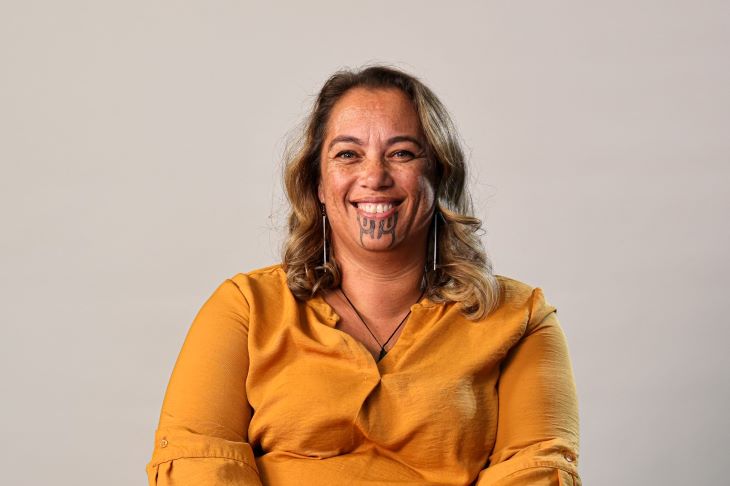Kylie Bryant: ‘I never felt culturally safe’

Our Māori Health Lead Kylie Bryant (Ngāti Maniapoto) knows more than most the importance of being treated in a culturally appropriate way. She explains the mahi we’re doing, including the launch of our cultural safety policy, Kawa Whakaruruhau.
Growing up in 1980s Aotearoa New Zealand, I never felt culturally safe – anywhere.
As someone of dual whakapapa – Māori and Pākehā – I didn't feel like I fitted into any space, and it left me wondering, ‘Where do I fit?’
Back then, as a country we were only starting to look at cultural safety, with nurse Irihapeti Ramsden (Ngāi Tahu, Rangitāne) leading the way.
As a consumer of health and other services, there was no one to guide me on what a culturally safe experience could, and should, look like.
That’s why our cultural safety mahi at ACC really resonates with me.
Since 2021, we’ve been looking at what culturally safe care looks like across the services we fund.
We’ve looked at the experience of kiritaki Māori (Māori clients) and their whānau as Te Tiriti o Waitangi/Treaty of Waitangi partners, and took the opportunity to refresh our Māori cultural competency guidance for providers.
The updated guidance, Te Whānau Māori me ō mahi, was written by cultural safety experts Mauri Ora Associates and launched in October last year.
We’ve also developed a new policy for providers, Kawa Whakaruruhau, which was released last month.
Through this, we want to ensure a consistent experience for our kiritaki and whānau, and support the movement across Aotearoa New Zealand to deliver appropriate care to people of all cultures and communities.
This mahi is reinforcing what’s already happening in the sector with providers who have existing competency standards in place.

Engaging with the sector
We’ve been grateful for the support of regulatory and professional bodies in developing our policy.
Their contributions, from the very early drafts, have been invaluable in ensuring our approach aligns with what’s already an accepted standard for our providers.
The sector will continue to be represented in the future of this mahi, through members of our External Reference Group. The group will help with implementing the policy, understanding what the experience is from a provider perspective and what monitoring could look like in future.
We’re looking to these partners to bring the knowledge of their own market and guide us in this space.
My role in all this is to support those people who really want to do well for our kiritaki and their whānau, but actually don't know where to turn.
I haven’t come across anyone in the sector that doesn’t want to do better and do the best job they can for the people in their care.
This includes engaging with cultural safety training and resources, like the ones we’ve developed at ACC and others that are widely available across the sector.
The meaning of cultural safety
Mauri Ora Associates founder, Dr Peter Jansen, explains cultural safety beautifully in his recent column.
Dr Peter Jansen: The importance of culturally appropriate care
“Cultural safety isn’t just about doing one specific thing to meet the needs of patients – it’s about understanding your culture and how that impacts on your approach to people,” he says.
“The key is not so much about running off and finding out about other cultures. It’s about finding out about yourself – where are my blind spots, where are my weaknesses that I need to work on in terms of understanding how I interact with other people.”

When we’ve reflected on our own biases, we’re more receptive to understanding others’ needs and what questions to ask them in order to give them a culturally safe healthcare experience.
For example, with both Māori and non-Māori whakapapa, someone shouldn’t make assumptions that I want everything to be delivered to me in a kaupapa Māori way.
There isn’t one single Māori perspective. As an urbanised Māori, I may have different needs to my cousins in Te Kuiti, for example.
Cultural safety is about meeting the requirements of the individual. It’s something that can only be judged by that individual and their whānau.
Right now, I know a lot of whānau who don’t complete their healing journey.
My hope is that through intentional shifts like this that we’re all part of in the sector, they’ll feel empowered.
They’ll have better experiences of care, they’ll stay on their recovery journey and be more inclined to return to us next time they need support.
With all of us doing our part and upholding the principles of Te Tiriti, then everybody wins.

More information
Resources and general information about cultural safety is available on our website.
Cultural safety and competencies
Webinar learning
You can also join us for a webinar to explore our new cultural safety policy, Kawa Whakaruruhau.
Our sessions will be presented by cultural competency and health sector expert Dr Peter Jansen and Māori Health Lead Kylie Bryant.
You’ll have the opportunity to hear about how this policy seeks to support a meaningful and sustainable advancement towards cultural safety across ACC-funded health services.
If you provide ACC-funded health or rehabilitation services as a contracted or non-contracted provider or supplier, then this webinar is for you.
Our cultural safety policy webinar takes place on Wednesday 31 May, 12pm to 1pm or 7pm to 8pm.
You can find out more and register on our website.





